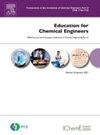化学工程中的协同在线国际学习(COIL):为学生适应多元文化和国际工作环境做好准备
IF 2.3
2区 教育学
Q1 EDUCATION, SCIENTIFIC DISCIPLINES
引用次数: 0
摘要
在当今相互联系的社会中,化学工程专业的学生必须准备好在国际和多元文化的环境中工作。然而,根据我们的经验,目前的化学工程课程往往不能培养这些能力。本研究旨在证明协作式国际在线学习(COIL)在化学工程教育中的益处。这是第一次在模拟课程中实施COIL方法。除了让学生为国际和多元文化的工作环境做好准备外,这种经历还提高了他们解决问题和批判性思维的能力。与其他COIL应用程序不同,该项目允许多种有效的解决方案,尽管并非所有解决方案都是最佳的。在两个成功的COIL项目后,来自巴利亚多利德大学(西班牙)、哥伦比亚国立大学和Autónoma新大学León(墨西哥)的化学工程专业学生报告说,他们对自己的知识和能力更有信心,为多元文化和国际工作环境做好了更好的准备,并且更有能力在第一份工作中表现出色。在这两个项目版本中,对相关问题的调查回答平均超过4分(满分5分)。从这项工作中得出的关键结论是,为了实现COIL的目标,有必要提前定义项目时间表,确保学生之间的知识水平相似,确认软件访问,建立统一的通信平台,并为每个团队进行单独的启动会议。此外,当团队成员中不超过50% %来自同一机构时,更有可能进行有效的国际合作。本文章由计算机程序翻译,如有差异,请以英文原文为准。
Collaborative Online International Learning (COIL) in chemical engineering: Preparing students for multicultural and international work environments
In today’s interconnected society, chemical engineering students must be prepared to work in international and multicultural environments. However, in our experience, current chemical engineering curricula often fail to develop these competencies. This study aims to demonstrate the benefits of Collaborative Online International Learning (COIL) in chemical engineering education. For the first time, the COIL approach has been implemented in a simulation course. In addition to preparing students for international and multicultural work environments, this experience enhances their problem-solving and critical-thinking skills. Unlike other COIL applications, this project allows for multiple valid solutions, though not all are necessarily optimal. After two successful COIL projects involving chemical engineering students from the Universidad de Valladolid (Spain), the Universidad Nacional de Colombia, and the Universidad Autónoma de Nuevo León (Mexico), students reported feeling more confident in their knowledge and abilities, better prepared for multicultural and international work environments, and more capable of performing well in their first job. In both project editions, survey responses to related questions averaged above 4 out of 5. Key takeaways from this work are that, to accomplish the objectives of a COIL, it is essential to define the project timeline in advance, ensure a similar level of knowledge among students, confirm software access, establish a unified communication platform, and conduct individual kickoff meetings for each team. Additionally, effective international collaboration is more likely when no more than 50 % of a team’s members come from the same institution.
求助全文
通过发布文献求助,成功后即可免费获取论文全文。
去求助
来源期刊

Education for Chemical Engineers
Multiple-
CiteScore
8.80
自引率
17.90%
发文量
30
审稿时长
31 days
期刊介绍:
Education for Chemical Engineers was launched in 2006 with a remit to publisheducation research papers, resource reviews and teaching and learning notes. ECE is targeted at chemical engineering academics and educators, discussing the ongoingchanges and development in chemical engineering education. This international title publishes papers from around the world, creating a global network of chemical engineering academics. Papers demonstrating how educational research results can be applied to chemical engineering education are particularly welcome, as are the accounts of research work that brings new perspectives to established principles, highlighting unsolved problems or indicating direction for future research relevant to chemical engineering education. Core topic areas: -Assessment- Accreditation- Curriculum development and transformation- Design- Diversity- Distance education-- E-learning Entrepreneurship programs- Industry-academic linkages- Benchmarking- Lifelong learning- Multidisciplinary programs- Outreach from kindergarten to high school programs- Student recruitment and retention and transition programs- New technology- Problem-based learning- Social responsibility and professionalism- Teamwork- Web-based learning
 求助内容:
求助内容: 应助结果提醒方式:
应助结果提醒方式:


